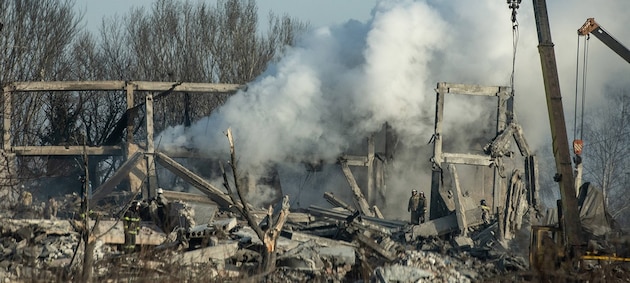The Russian Defense Ministry is said to have invented a “retaliatory attack” for the deadly New Year’s Eve attack on a military barracks in Makiivka. Wagner boss Prigozhin is expanding his association with Russian governors – and is apparently targeting mineral resources. what happened in the night
Kremlin invents “retaliation” for New Year’s attack that kills hundreds
On New Year’s Eve, the Ukrainian army managed a significant blow against the Russian attackers. Hundreds of Russian soldiers are believed to have died in a rocket attack on their military base in the small town of Makiivka in eastern Ukraine. Moscow spoke of 89 dead, Ukraine of 400.
Now the Russian Defense Ministry claims that the Russian army managed to “retaliate” for Makiivka against Ukrainian forces. However, that is wrong, say the analysts at the US think tank “Institute for the Study of War”.
The ministry spoke on Sunday of an attack that killed 600 Ukrainians in Kramatorsk in Donetsk. However, a reporter from Finland visited the alleged attack site the same day and found that an empty school, not a Ukrainian base, was hit.
Schmyhal: Russia creates ‘biggest minefield in the world’
Russia has created “the world’s largest minefield” in Ukraine. Ukrainian Prime Minister Denys Schmyhal said in an interview with the South Korean news agency Yonhap. According to Schmyhal, Russian forces have mined around 250,000 square kilometers of Ukrainian land. That would correspond to about 40 percent of the country. Russia is also directing its attacks against the population. 70 percent of the damage would be in residential areas.
Prigozhin has his sights set on Bakhmut’s natural resources – and continues to form an alliance
The head of the Wagner mercenary group, Yevgeny Prigozhin, wants to mine the mineral resources around the contested Bakhmut region in order to earn money. This was announced by a White House official, according to the Institute for the Study of War. Prigozhin would target salt and gypsum from the mines in particular. On January 7, he explained that the mines had “unique and historic defenses” that functioned as a “network of underground cities.” They would be able to house personnel and military equipment at a depth of up to 100 meters, Progishin said. According to the “ISW”, this is another attempt to explain why the area is of such great importance, despite the sluggish advance of his Wagner mercenaries near Bachmut.
Meanwhile, Prigozhin continues to form alliances with high-ranking Russian governors in order to expand his power. The governor of the Kursk region, Roman Starovoit, visited the Wagner training center in Kursk on January 8th. Some Russian media even called Starovoit’s visit to the training ground exemplary behavior for a Russian politician, which further boosted “Prigozhin’s image as a patriotic war leader,” according to the ISW.
OSCE Secretary General against Moscow’s expulsion from the organization
The Secretary General of the Organization for Security and Co-operation in Europe (OSCE), Helga Maria Schmid, spoke out against Russia being excluded from the group. Keeping diplomatic channels open does not mean that there is agreement, Schmid told the “Welt” (Monday). “In any case, from today’s perspective, I think it makes sense for Russia to remain a member of the OSCE.” Ukrainian Foreign Minister Dmytro Kuleba had called for Moscow to be excluded in view of the Russian war of aggression against his country. “One day we will need communication channels again,” said the top German diplomat.
That will be important on Monday
In Russia, the holidays end after the turn of the year and politics returns to everyday life. At the front, the Russian troops are likely to continue their attacks on Bakhmut and Soledar in hopes of a breakthrough.
Also read: The Ukraine update of January 8th















